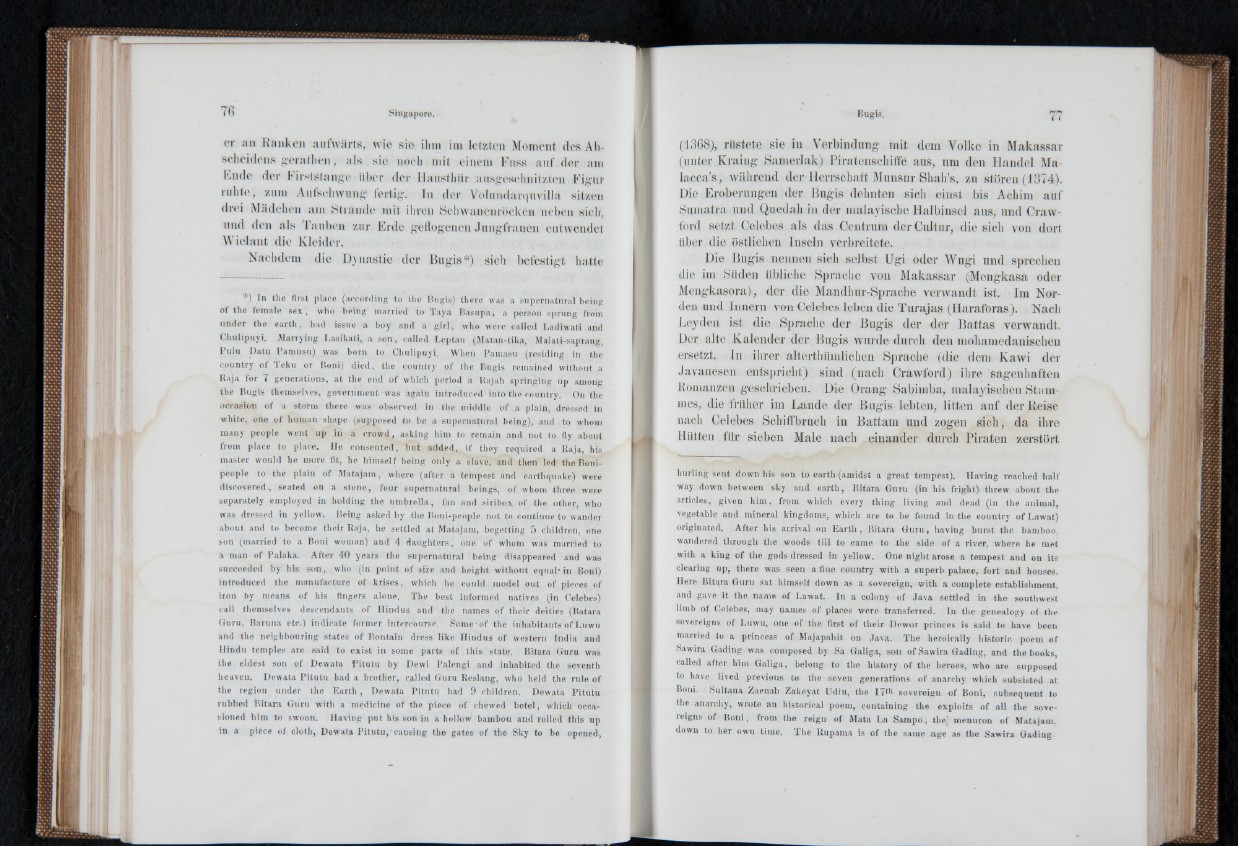
er an Ranken aufwärts, wie sie iiim im letzten Moment des Abscheidens
gerathen, als sie noch mit einem Fass auf der am
Ende der Firststange über der Häusthür ausg’eschuitzten Figur
ruhte, zum Aufschwung fertig. In der Volundarquvillä sitzen
drei Mädchen am Strande mit ihren Schwanenröcken neben sich,
und den als Tauben zur Erde geflogenen Jungfrauen entwendet
Wiel an t die Kleider.
Nachdem die Dynastie der Bugis*) sieh befestigt hatte
'*") the first place (according to the Bugis) there was a supernatural being
of the female sex , who being married to Taya Basupa, a person sprung from
under the earth, had issue a boy and a girl, who were called Ladiwati and
Chulipuyi. Marrying Lasikati, a so n , called Leptau (Matan-tika, Malati-saprang,
Pulu Data Pamusu) was born to Chulipuyi. When Pamasii (residing in the
country of lek u or Boni) died, the country of the Bugis remained without a
Raja for 7 generations, at the end of which peTiod a Rajah springing up among
the Bugis themselves, government was again introduced into the country. On the
occasion of a storm there was observed in the middle of .a plain, dressed in
white, one of human shape (supposed to be a supernatural being), arid to whom
many people went up in a crowd, asking him to remain and not to- fly about
from place to place. He consented, but added, if they required a Raja, his
master would he more fit, he himself being only a slave, and then led the Bonipeople
to the plain of Matajam, where (after a tempest and earthquake) were
discovered, seated on a stone, four supernatural beings, of whom three were
separately employed in holding the umbrella, fan and siribox of the other, who
was dressed iu yellow. Being asked by the Boni-people not to continue to wander
about and to become their Raja, he settled at Matajam, begetting 5 children, one
son (married to a Boni woman) and 4 daughters, one of whom was married to
a man of Palaka. After 40 years the supernatural being disappeared and was
succeeded by his son , who (in point of size and height without equal* in Boni)
introduced the manufacture of krises, which he could model out of pieces of
iron by means of his fingers alone. The best informed natives (in Celebes)
call themselves descendants of Hindus and the names of their deities (Batara
Guru, Baruna etc.) indicate former intercourse. Some-of the inhabitants of Luwu
and the neighbouring states of Bontain dress like Hindus of western India and
Hindu temples are said to exist in some parts of this state. Bitara Guru was
the eldest son of Dewata Pitutu by Dewi Palongi and inhabited the seventh
heaven. Dewata Pitutu had a brother, called Guru Reslang, who held the rule of
the region under the Earth, Dewata Pitutu had 9 children. Dewata Pitutu
rubbed Bitara Guru with a medicine of the piece of chewed betel, which occasioned
him to swoon. Having put his son in a hollow bambou and rolled this up
in a piece of cloth, Dewata Pitutu, causing the gates of the Sky to be opened,
(1368), rüstete sie iu Verbinduug mit dem Volke in Makassar
(unter Kraing Samerlak) Piratenscliiffe aus, um den Handel Ma-
lacca’s , während der Herrschaft Munsur Shah’s, zu stören (1374).
Die Eroberungen der Bugis dehnten sich einst bis Achim auf
Sumatra und Quedah in der malayische Halbinsel aus, und Craw-
ford setzt Celebes als das Centrum der Cultur, die sich von dort
über die östlichen Inseln verbreitete.
Die Bugis nennen sich selbst Ugi oder Wugi und sprechen
die im Süden übliche Sprache von Makassar (Mengkasa oder
Mengkasora), der die Mandhur-Sprache verwandt ist. Im Norden
und Innern von Celebes leben die Turajas (Haraforas). Nach
Leyden ist die Sprache der Bugis der der Battas verwandt.
Der alte Kalender der Bugis wurde durch den mohamedanischen
ersetzt. In ihrer alterthitmlichen Sprache (die dem Kawi der
Javanesen entspricht) sind (nach Crawford) ihre sagenhaften
Romanzen geschrieben. Die Orang Sabimba, malayiscben Stammes,
die früher im Lande der Bugis lebten, litten auf der Reise
nach Celebes Schiffbruch in Battam und zogen sich, da ihre
Hütten für sieben Male nach einander durch Piraten zerstört
hurling sent down his son to earth (amidst a great tempest). Having reached half
way down between sky and earth, Bitara Guru (in his fright) threw about the
articles, given him, from which every thing living and dead (in the animal,
vegetable and mineral kingdoms, which are to be found in the country of Lawat)
originated. After his arrival on Earth, Bitara Guru , having burst the bamboo,
wandered through the woods till to came to the side of a river, where he met
with a king of the gods dressed in yellow. One night arose a tempest and on its
clearing up, there was seen a fine country with a superb palace, fort and houses.
Here Bitqra Guru sat himself down as a sovereign, with a complete establishment,
and gave it the name of Lawat. In a colony of Java settled in the southwest
limb of Celebes, may names of places were transferred. In the genealogy of the
sovereigns of Luwu, one of the first of their Dewor princes is said to have been
married to a princess of Majapahit on Java. The heroically historic poem of
Sawira Gading was composed by Sa Galiga, son of Sawira Gading, and the books,
called after him Galiga, belong to the history of the heroes, who are supposed
to have lived previous to the seven generations of anarchy which subsisted at
Boni. Sultana Zaenab Zakeyat Udiu, the 17tl1 sovereign of Boni, subsequent to
the anarchy, wrote an historical poem, containing the exploits of all the sovereigns
of Boni, from the reign of Mata La Sampo, the,' menuron of Matajam,
down to her own time. The Rupama is of the same age as the Sawira Gading.